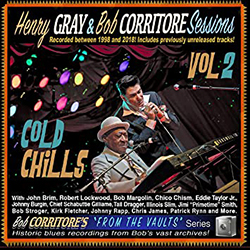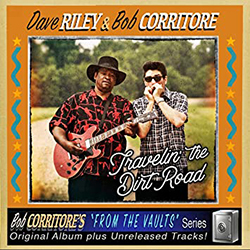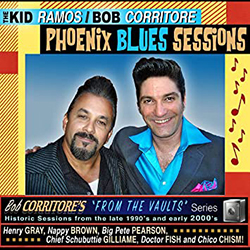Bob Corritore's From The Vaults Series
- chicagobluesguide
- Jan 19, 2021
- 6 min read
Release date: December 31, 2020
SWMAF Records
By David Whiteis
Phoenix, Arizona-based harpist and club owner Bob Corritore, has taken it as a personal mission to help keep alive the legacies of blues artists, both well-known and obscure, whom he books in his Rhythm Room club and never misses a chance to record when they hit town. Consequently, Corritore has amassed a vast collection of his recorded collaborations with many blues greats, both past and present. These three CDs, released simultaneously, are the first offerings from Corritore’s From The Vault series on his Southwest Musical Arts Foundation imprint, distributed by the Vizztone Label Group.
Henry Gray & Bob Corritore
Cold Chills: Henry Gray & Bob Corritore Sessions, Vol. 2
SWMAF - 17
As a staunch blues traditionalist, Corritore prefers stripped-down settings that showcase his artists in contexts as uncluttered, and emotionally immediate, as possible. Although through the years he has focused primarily on veterans (many still “deserving of wider recognition,” as that irony-laden cliché would have it), he has also taken the effort to recognize younger figures whose careers are still on an upward trajectory.
Here, though, the featured artist is a true “living legend” who garnered international acclaim before his death at age 95 in February of 2020. Pianist Henry Gray was living in his hometown of Baton Rouge, Louisiana when he passed; he’d been based there for years, but most blues lovers probably still know him primarily as an important figure on Chicago’s postwar scene, where worked for over twenty years with such blues immortals as Jimmy Reed, Little Walter, Rice Miller (Sonny Boy Williamson No. 2), and, most famously, Howlin’ Wolf. In his later years, Gray traveled often to Phoenix, where Corritore booked him in the Rhythm Room and recorded sessions on him. This disc features tracks from 15 of those sessions, spanning the entire 20 years of their recorded musical relationship.
Although the tracks aren’t in chronological order, it’s clear that Gray’s gifts remained virtually undiminished, even in his 90s. We’re treated to a diverse set, ranging from well-known standards through several previously unheard or obscure rough-cut diamonds, including at least one Henry Gray original (a searing, personalized recasting of “Cold Chills”, actually a Jimmy Reed standard but credited to Gray here, no doubt because of the creativity he brought to this re-imagining). Throughout the set, Gray’s gutsy, life-toughened vocals and evocative piano work – meditative and tender in places, barrelhouse-rattling and jubilant in others – interweaves with Corritore’s harp stylings (he channels the spirits of the ancestors – both Walters, both Sonny Boys, Jimmy Reed – with unerring accuracy) to invoke the sounds of a bygone era, but with an emotional and artistic immediacy that places this music resolutely, and joyfully, in the present tense. (A special, albeit nonmusical, treat is a brief recording of a phone call that the late John Brim made to Corritore, requesting Gray’s presence on an upcoming recording session.)
It should also be noted that a remarkable array of sidemen is on hand – start with Robert Lockwood Jr., John Brim, Chico Chism, Bob Stroger, Eddie Taylor Jr., Tail Dragger, and go on from there – to add further depth and texture to a set honoring music that refuses to grow old, not as an exercise in nostalgia or “revivalism”, but as an in-the-moment celebration of music and life.
~~~
Dave Riley & Bob Corritore
Travelin’ the Dirt Road
SWMAF-15
Guitarist/vocalist Dave Riley was born in Mississippi in 1949; he moved to Chicago with his family in 1961. There he sang in his family’s gospel group, and he also immersed himself in the sounds of the blues, which had waned in popularity but was still a cultural force in the city’s Black communities at the time. He’s been through his share of hard times in life, and it’s reflected in his sound – emotionally intense, a little rough around the edges, featuring his corrugated vocals supported by somewhat elemental but emotionally resonant guitar leads.
This reissue of a disc that was originally released in 2007 includes two tracks that were not on the original. Riley, who wrote ten of the set’s twelve songs, is accompanied by a full band that includes his son, Dave Jr., who has been his regular bassist since 1996 (with time off for Dave Sr. to recover from the effects of a 1998 automobile accident). The band is tight and devoid of flamboyance, straight-ahead in that postwar groove that producer Corrritore loves so much and which Riley himself pretty much grew up on (he has remembered standing outside urban jukes in Chicago, hearing the sounds of blues masters like Howlin’ Wolf emanating from within, and like countless others he bathed in the blues every Sunday morning in Chicago’s fabled open-air Maxwell Street Market).
Although everything here is solidly rooted in that timeless style, within those constraints there’s plenty of variety on offer. Jaunty, irony-laden odes to conjugal discord (“I’m Not Your Junkman,” penned by the late John Weston; Riley’s own “My Baby’s Gone”) share the spotlight with slow-grinding, eros-dripping after-hours squeezefests (“Come Here Woman,” featuring Corritore sounding possessed by the ghost of Big Walter Horton) and Delta-haunted flashbacks (“Doggone Blues,” the appropriately named “Way Back Home”). For devotees of the classic postwar style purveyed by musicians for whom it’s not a relic but a fully contemporary means of expression, this set is highly recommended.
~~~
Kid Ramos / Bob Corritore
Phoenix Blues Sessions
SWMAF-15
Guitarist Kid Ramos may not be quite as well known among the general blues audience as many of the other artists Bob Corritore has showcased in his ongoing series of collaborations, but he does have a notable track record, having released at least five solo albums since 1995 on such labels as Black Top, Evidence, and Rip Cat Records, and with a resume that includes gigs and session work with the likes of the Fabulous Thunderbirds, the Mannish Boys, James Harman, Roomful of Blues, Bobby Jones, Los Fabulocos, and others.
On this disc, originally released in 2012 as a benefit for Ramos, who was enduring a bout with cancer during that time, he and Corritore are accompanied by an impressive array of blues stalwarts, including Henry Gray (piano), Nappy Brown (vocals), Big Pete Peterson (vocals), and Chico Chism (drums), among others. That roster of sidemen and colleagues promises a roots-rich blues set, and from the first bars of “Aw Shucks Baby,” the set’s opener, it’s clear that’s what we’re going to get. As is usual with Corritore’s projects, much of this set sounds as if it’s emanating from long-lost acetates from 1950s-era studio sessions.
Especially notable are the vocalists: Famed blues shouter Nappy Brown, who died in 2008 (it’s clear that not all of these tracks were actually recorded in 2012), brings his powerful, ebullient low-range baritone to “Aw Shucks Baby” and “Baby Don’t You Tear My Clothes” (a hokum-flavored ditty usually associated with either Lightnin’ Hopkins or Smokey Hogg, who gets co-writer’s credit here, but actually first recorded by the State Street Boys, featuring Big Bill Broonzy, in 1935). Outings like “Snakes Crawls at Night,” featuring gutbucket vocals from longtime Rhythm Room favorite Chief Schabuttie Gilliame laid over a raw, edge-of-chaos, juke-rattling backing, sound intentionally crafted to invoke earlier, less self-conscious eras (a paradox, admittedly, but a fun one); the late Chico Chism, who play drums throughout, also contributes his wry, unaffected vocals to Junior Parker’s “Mother-In-Law Blues.”
Pete Peterson’s gristly, somewhat strained-sounding vocal delivery adds both intensity and exuberance to “Natural Ball” (previously unissued) and Little Milton’s “Possum In My Tree”; Henry Gray, sounding as ageless and indestructible as ever, breathes new life into such chestnuts as “Come On In” (credited to one “Harum Scarums” but actually based on a venerable string band / medicine show theme), Elmore James’s “I Held My Baby Last Night,” and his own offering, the rollicking “Talkin Bout You.” Lesser-known singers, such as Dr. Fish on the searing “24 Hours,” also comport themselves admirably.
Corritore, characteristically, gives what amounts to a postwar Chicago harmonica workshop throughout the set, as guitarist Ramos and the rhythm section fire up that jubilant retro-shuffle sound, invoking the glories of a yesteryear that many of these principals lived through, and which the rest, including both Corritore and Ramos himself, have worked earnestly to recreate in their own image.
Buy the music HERE
###



